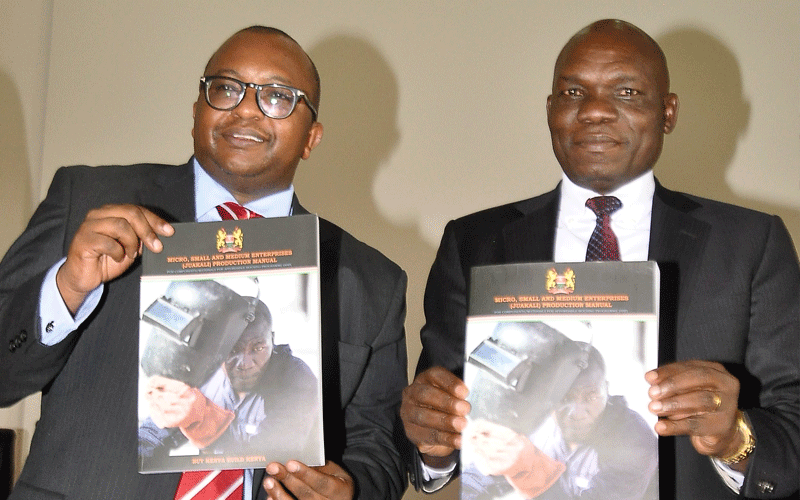Jua kali sector grapples with affordable housing supplies
By Milliam Murigi, February 14, 2020
Milliam Murigi @millymur1
The jua kali (informal) sector is grappling with government orders worth millions of shillings under the affordable housing programme.
Lack of capital to meet the huge quantities required, expensive timber and other raw materials as well as the need to supply standardised items in a short time is frustrating the sector.
Last year, the government said it was set to place a Sh3 billion procurement order with the informal sector to produce 100,000 doors and 120,000 windows as local product suppliers providers for the affordable housing programme.
The Ministry of Transport, Infrastructure, Housing, Urban Development and Public Works urged informal sector players to work within their associations so that they could access opportunities as project suppliers of doors and windows for State projects. About 70 items can be supplied by the jua kali sector, including metal grills, cupboards, wardrobes and gates.
Speaking during the opening of the Micro, Small and Medium Enterprises Jua Kali Sensitisation Programme and launch of a Jua Kali Production Manual in Nairobi, Housing PS Charles Hinga said the ministry had ring-fenced some components used in the construction that the jua kali sector can supply.
Sub contracts
“We are offering the artisans an opportunity to participate in the construction of houses in the affordable housing programme.
The sector is a big contributor to employment in the country and a key enabler for the manufacturing sector.
We are keen to upskill them to enable them to contribute to this national development project while supporting their growth,” he said.
However, officials of Ngokamka Holdings Limited, an umbrella organisation formed by three jua kali groups, says they have only been able to supply doors for the State’s pioneer housing development, Park Road in Nairobi.

Ngokamka is a holding company formed and registered in 2018. Its members are drawn from three jua kali groups—Ngong Road, Kamukunji and Kariobangi Jua Kali associations.
It is one of the informal groups brought on board by the State to complement the services of the Chinese contractor who was contracted to build 1,370 housing units at Parkroads project in Nairobi.
“We were sub-contracted to provide doors for the project,” says the company’s managing director Joseph Muhia, who also doubles up as Ngong Road Jua Kali Association chairman.
The first contract signed with the contractor was to supply 8,400 windows and 7,000 doors for the flagship project, but eventually, only doors were supplied.
“We were to do both the doors and windows for the pilot phase, but we had to drop the windows along the way.
This is because the price quoted for windows by the contractor was too low and we decided to drop the order rather than make losses,” says Muhia.
He says the contractor wanted someone who could supply ‘five feet by five feet’ metallic windows at Sh2,500, but when we did our calculations, we realised it was impossible to work with that budget.
For such a window the minimum cost of production was adding up to Sh12,500. The contract was later awarded to another group and we are grateful,” says Muhia.
Ill-equipped
According to PS Hinga, after the contract re-negotiations, the jua kali association dropped the contract to supply windows for the pilot project.
“But we have agreed that for the next project, they will supply both windows and doors and eventually also supply the other 67 construction-related items that must be procured locally for this programme,” Hinga says.
Muhia says none of the associations in his group had ever dealt with such a huge project. “We didn’t know where to start, especially during the negotiation process.
We prepared quotations without including taxes. We thought the contractor was to pay the tax,” he says.
Ngokamka Holding was, therefore, forced to go back to the drawing board after having to work out how to include taxation. “We also had to do research on new designs, which were presented to us by the contractors,” says Muhia.
“Through the help of the Executive Office of the President SME Special Advisor, we managed to put everything in order and came into a conclusion with the contractor,” he adds.
To help fund the sector, a multi-agency committee led by National Construction Authority (NCA) is expected to provide suppliers with 30 per cent advance payment upon the successful bidding process.
Together with jua kali association officials, the housing and industrialisation ministries, NCA developed a manual for the jua kali sector on standards required to meet orders under the housing programme.
NCA Executive Director Maurice Akech said the MSME Jua Kali Production Manual for the components of the affordable housing programme is to provide stakeholders with the standards required to design and manufacture components for affordable housing projects.
“The jua kali sector is expected to forge most of the metal and wooden fixtures such as doors and windows,” insists Hinga.